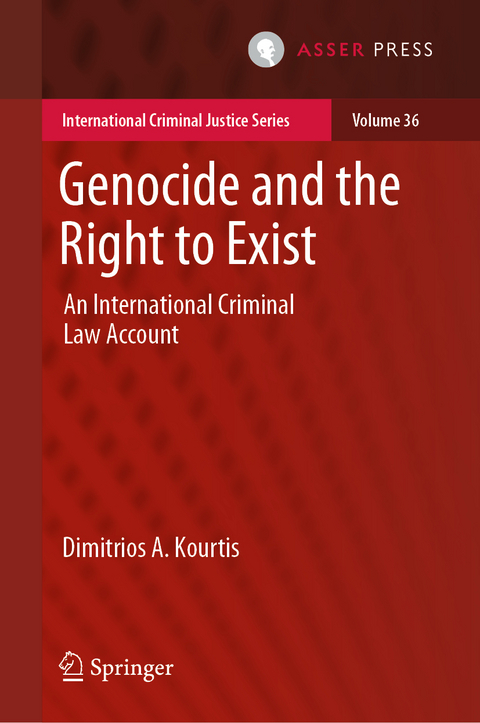
Genocide and the Right to Exist
An International Criminal Law Account
Seiten
2025
|
2025 ed.
T.M.C. Asser Press (Verlag)
978-94-6265-658-1 (ISBN)
T.M.C. Asser Press (Verlag)
978-94-6265-658-1 (ISBN)
- Noch nicht erschienen - erscheint am 02.02.2025
- Versandkostenfrei innerhalb Deutschlands
- Auch auf Rechnung
- Verfügbarkeit in der Filiale vor Ort prüfen
- Artikel merken
This book delves into the complexities of genocide as a legal concept, offering a fresh perspective by exploring the rights of groups to exist under international criminal law. It presents an in-depth analysis of group rights, challenging traditional interpretations within the context of the Genocide Convention. By focusing on the conceptual and practical implications of recognizing groups as rights-holders, this work introduces a nuanced understanding of collective rights and their enforcement.
What sets this approach apart is its thorough examination of both the theoretical foundations and the operational aspects of international law concerning genocide. The book provides a critical assessment of various legal theories, addressing how these can be reconciled with the dynamic nature of international human rights practices. It also highlights the potential for these theoretical frameworks to impact the protection of vulnerable groups on a global scale.
The scope of this work is broad yet detailed, encompassing an analysis that will be invaluable for legal practitioners, scholars, and policymakers. It systematically addresses the ambiguities and challenges in defining and prosecuting genocide, offering strategic insights into the enhancement of legal frameworks to prevent such atrocities. The book incorporates primary archival research that brings to light new evidence on the drafting of the Genocide Convention, including cases such as that of the Greek children, which have previously been underexplored.
The primary audience for the work includes academics and students in the fields of international law, international criminal law, criminal law, human rights, and genocide studies, as well as diplomats, policy-makers, legal professionals, historians, sociologists, anthropologists, philosophers specializing in genocide, and genocide scholars in general. The insights provided will be crucial for anyone committed to advancing the understanding and implementation of international law protecting group rights.
Dimitrios Kourtis holds a PhD and is a Post-doctoral Researcher and Teaching Fellow in the Department of International Studies at the Faculty of Law of the Aristotle University in Thessaloniki, Greece.
What sets this approach apart is its thorough examination of both the theoretical foundations and the operational aspects of international law concerning genocide. The book provides a critical assessment of various legal theories, addressing how these can be reconciled with the dynamic nature of international human rights practices. It also highlights the potential for these theoretical frameworks to impact the protection of vulnerable groups on a global scale.
The scope of this work is broad yet detailed, encompassing an analysis that will be invaluable for legal practitioners, scholars, and policymakers. It systematically addresses the ambiguities and challenges in defining and prosecuting genocide, offering strategic insights into the enhancement of legal frameworks to prevent such atrocities. The book incorporates primary archival research that brings to light new evidence on the drafting of the Genocide Convention, including cases such as that of the Greek children, which have previously been underexplored.
The primary audience for the work includes academics and students in the fields of international law, international criminal law, criminal law, human rights, and genocide studies, as well as diplomats, policy-makers, legal professionals, historians, sociologists, anthropologists, philosophers specializing in genocide, and genocide scholars in general. The insights provided will be crucial for anyone committed to advancing the understanding and implementation of international law protecting group rights.
Dimitrios Kourtis holds a PhD and is a Post-doctoral Researcher and Teaching Fellow in the Department of International Studies at the Faculty of Law of the Aristotle University in Thessaloniki, Greece.
Chapter 1. Introduction.- Chapter 2. Group Rights and the Right to Exist.- Chapter 3. Understanding the Collective Right to Exist: Acoustic Separation and Survival Units.- Chapter 4. Grouphood in the Law on Genocide.- Chapter 5. The Protected Value and the Prohibition of Genocide.- Chapter 6. Genocide and Impossible Attempts: Transcending Acoustic Separation.- Chapter 7. Reconciling the Social and the Legal: Genocide as a Process.- Chapter 8. The Contextual Element and the Inchoate Offenses of Genocide.- Chapter 9. The Structure of Endangerment in the Actus Reus of Genocide.- Chapter 10. A Realistic Genocidal Intent.- Chapter 11. As Such: A Definitional Element or an Interpretative Aid?.- Conclusions.
| Erscheint lt. Verlag | 13.3.2025 |
|---|---|
| Reihe/Serie | International Criminal Justice Series |
| Zusatzinfo | 1 Illustrations, color; 2 Illustrations, black and white; XXI, 674 p. 3 illus., 1 illus. in color. |
| Verlagsort | The Hague |
| Sprache | englisch |
| Maße | 155 x 235 mm |
| Themenwelt | Recht / Steuern ► EU / Internationales Recht |
| Recht / Steuern ► Öffentliches Recht ► Völkerrecht | |
| Sozialwissenschaften ► Politik / Verwaltung | |
| ISBN-10 | 94-6265-658-4 / 9462656584 |
| ISBN-13 | 978-94-6265-658-1 / 9789462656581 |
| Zustand | Neuware |
| Informationen gemäß Produktsicherheitsverordnung (GPSR) | |
| Haben Sie eine Frage zum Produkt? |
Mehr entdecken
aus dem Bereich
aus dem Bereich


